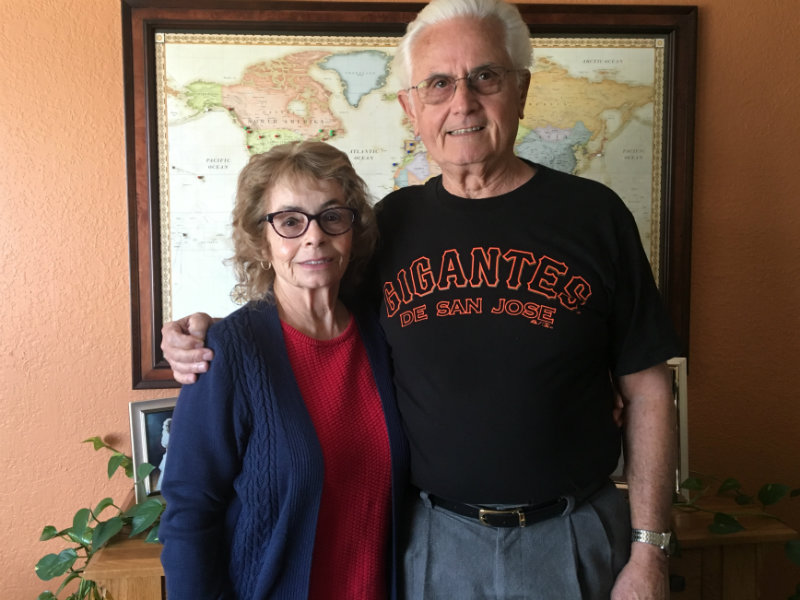If you want reliable retirement security, the general wisdom is to get a job in the public sector. Most government employers still offer their retirees a guaranteed monthly pension check — unlike private employers. Is it a necessary perk to keep public sector jobs competitive or just too expensive, given the public sector pension debt challenging cities and states around the country?
Ted Santos has an opinion. He’s a 78-year-old retired welder and maintenance supervisor living with his wife in San Jose, California. He spent most of his 45-year career working for San Jose State University, a public employer. He says his peers in the private sector always asked him why he decided to work for the state. "You’re not gonna make any money there," they would tell him. "I want security," he would reply. What he meant was retirement security.

Ted (right) and Rachel (left) Santos of San Jose are pictured here. Ted Santos worked as a welder and maintenance supervisor with San Jose State University for 45 years. Sam Harnett / Capital Public Radio
Santos, like most public sector retirees, is on a Defined Benefit pension plan, which means he gets a monthly check plus health care for the rest of his life. A private employer might have offered Santos a 401(k), but likely not a guaranteed pension.
As Stanford University Finance Professor Josh Rauh points out, the private sector has moved totally away from defined benefit pension promises.
"Most of us who work in the private sector are relying on our own ability to invest our own money,” he says. “The public sector in the meantime has got these guarantees which have until now been ironclad."
But escalating debt from public sector pension IOU’s has raised questions about whether the defined benefit pensions should indeed remain ironclad. Dave Low, executive director of the California School Employees Association, says they should.
He claims the pension is often what entices someone to work in the public sector instead of the private sector.
"Because there’s some greater level of stability," he says.
He points to San Jose. Back in 2012, the city tried making deep cuts to public workers’ pensions, and several hundred police officers responded by fleeing to departments in other cities. Low says that clearly shows pensions are required for recruitment and retention of workers.
"Because nobody’s going to go work and put their life on the line without having some security for their families," Low says.
But, according to Josh Rauh, defined benefit pensions plans aren’t the only way to attract and reward workers. He believes we should compensate public employees for the tough work they do.
"In current pay," he says. "Not in promises that are hard to deliver on."
In Rauh’s scenario, workers could invest percentages of their higher salaries into their own retirement plans. David Madland isn’t convinced. He’s a senior fellow at the Center for American Progress. He says this approach works for people who are market-savvy and know how to save and invest throughout their lives. But for most people, it doesn’t work because they make mistakes about how to invest. They don’t know how long they’re going to live.
"The 401(k) system has turned everything onto the individual," Madland says. " It’s like asking the individual to be their own dentist. They really aren’t well equipped to do it."
401(k) style retirement plans are cheaper and more flexible for employers to operate. But Madland says because the public sector has a large pool of workers this spreads out the risk of a guaranteed pension.
Still, Josh Rauh argues that risk has put a number of states in debt. It's happened here in California to the tune of more than $241 billion as of 2014.
"I’m not optimistic that the political process is gonna lead us to a solution before we have more very serious crises including city bankruptcies," Rauh says. "Which are gonna really impact people's lives on a daily basis."
Still, at the end of the day, retired public worker Ted Santos, says, "if you want reliable employees to do good work and to keep them for the long haul, you’ve gotta treat them right."
And that’s true in the public and the private sector. The question is, how do you do that and still stay in the black?
Follow us for more stories like this
CapRadio provides a trusted source of news because of you. As a nonprofit organization, donations from people like you sustain the journalism that allows us to discover stories that are important to our audience. If you believe in what we do and support our mission, please donate today.
Donate Today